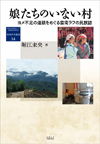This post is also available in: Japanese

34. A Village without Daughters: Bride Shortage, Marriage Migration and
Women’s Belonging among the Lahu of Southwest China
HORIE, Mio.
Published in March, 2018.
Kyoto University Press.
Description
This ethnography analyzes the actual situation of women’s out-migration among Lahu people of Southwest China. Today the Lahu women’s migration is based on the male-female ratio imbalance as well as the inter-regional economic disparity in China. Since 1980s, the One Child Policy made the sex-ratio imbalance increasingly serious; the number of females decreased as many Han Chinese preferred to have a male child as the household inheritor. As a result, many single men today face difficulties in finding women to marry. A number of men have even ventured out to ethnic minority areas in the country’s southwestern region such as Yunnan, where the bride price is lower. The Lahu, an ethnic group living in the southwestern part of Yunnan, has become one of the targets for many Han bachelors, who travel from east and north eastern China in search of a bride.
Based on two and a half year’s fieldwork in a Lahu village, this book shows how the ideas of family, marriage, and gender have changed among the Lahu. In the existing scholarship, the logic of the migrating women—that is, that of the sending society—has received scant attention. This book analyzes the anxiety and ambiguity found among the women towards marriage and it illuminates how the families and boyfriends remain in the Lahu village try to interact with such women. Ultimately, this ethnographic study revisits the concept of agency which is frequently used in women’s migration studies and presents a new understanding in terms of locality and personhood. It proposes that the concept be used as a tool to analyze one’s interpretation of another person’s behavior based on the local sense of personhood.